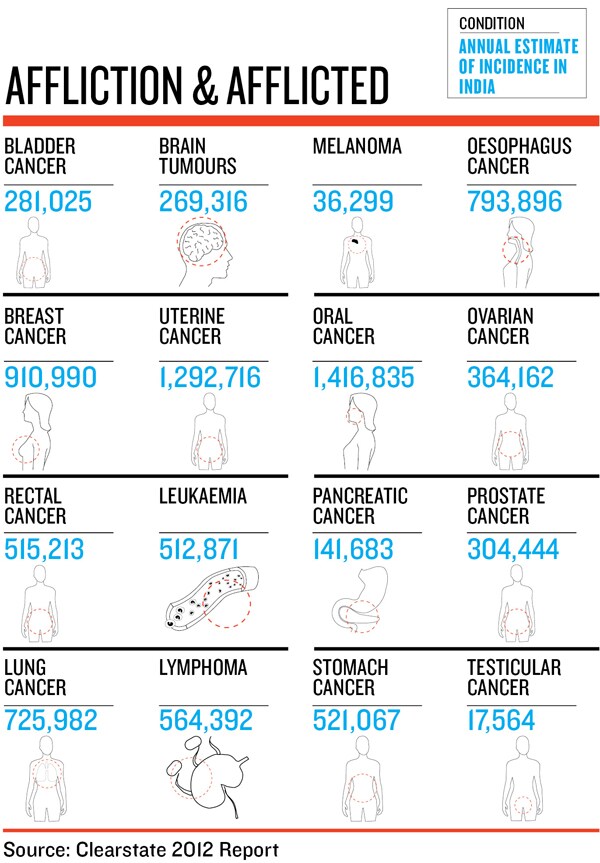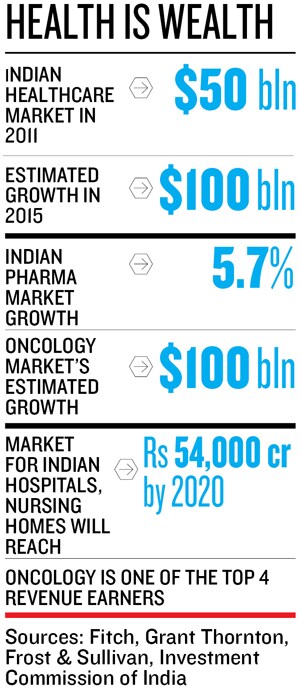Beyond Cancer - Handled With Care
As it ventures into multi-specialty care, will HCG be able to keep its personalised touch?


There’s only one way to treat cancer: The right way, the first time.
This may sound odd for a disease which has a lasting fault line between the current practice and rapidly advancing therapies. But for oncologist Dr BS Ajaikumar, founder-chairman and CEO of HealthCare Global Enterprise (HCG), it’s a philosophy that can change the face of cancer care in India.
He’s been at it for 20 years. In the process, his enterprise has morphed from a single unit—the Bangalore Institute of Oncology (BIO)—into HCG, India’s largest cancer care network with 22 hospitals. He took the concept of neighbourhood day care centres to smaller towns where patients often dread the disease as much as the travel and dislocation associated with it.
Today, when Dr Ajaikumar looks at the over-crowded centres in Erode, Ranchi, Shimoga and Vijaywada, he wonders where these patients went for treatment earlier. During these years, he developed a technology-backed system to create centrally managed customised care to treat 40,000 new patients every year. Alongside, he also assiduously built another model—making doctors invest in the enterprise, and in the vision. Today, of 350 oncologists at HCG, 170 own a piece of it.
But Dr Ajaikumar is not content. Even as HCG continues to add new niches in cancer care, with plans to add eight more centres by 2013 when it intends to go public, he is venturing into multi-specialty hospitals through a large greenfield project in Pune. Though this shift brings scale, it also runs the risk of moving away from personalised care.
However, this unassuming doctor thinks otherwise. He wants to create “verticals led by specialist doctors” and use his experience to gain better operational efficiency. “If I reach Rs 100 crore topline [sales] in the third year, I am confident I can get Rs 20 crore in EBITDA [earnings before interest, taxes, depreciation, and amortization] in the same year, whereas I have seen others struggle to reach an EBITDA of Rs 5 crore in the fourth or fifth year.”
Dr Ajaikumar didn’t start out with honed business skills in 1991 when he, along with a few doctors, set up BIO. Then, as a practicing doctor near Chicago, US, he’d spend four months in India and travel widely to assess the quality of cancer care. Most of it was at government or trust hospitals which were over-burdened and used old technology that under-treated patients and left serious side effects.
“I was convinced that cancer care needed private enterprise,” he says. He returned to India in 2001 and acquired an oncology clinical research start-up called Triesta Life Sciences in 2005, renaming the combined entity as HCG. Beginning 2007, private equity investors like IDFC, Premji Invest, Evolvence Life Sciences and Milestone pumped in money. Fund infusion led to rapid growth. Its revenue grew five-fold, reaching Rs 280 crore in 2012. It expects to gross Rs 400 crore next year. If this growth looks like a hospital on steroids, Dr Ajaikumar explains that scale is the only way to reduce per unit cost in this high-capital expenditure business.
“Ajai has a grand vision a definitive view of onco care,” says Gaans Ganapathy, founder of Triesta and now a director at HCG. He wanted to bring the integrated model of the US to India, but it was a challenge, says Ganapathy. But technology has been a great leveller. HCG relies heavily on it by providing targeted surgeries and keeping the equipment tuned to its protocol. All linear accelerators are programmed from Bangalore. All diagnostic tests are performed by Triesta. It also has a ‘strategic’ relationship with GE Healthcare India on molecular imaging and other latest medical technologies.
In his book The Emperor of All Maladies, Pulitzer-prize winning oncologist-writer Dr Siddhartha Mukherjee calls cancer “the quintessential product of modernity”. Ironically, the disease also requires a quintessential modern characteristic—individualism—in its treatment. Though surgery, radiation and chemotherapy are the standard treatments, how they are used in combination varies from person to person. If you don’t hurry the first time, you can nail the disease, says Dr Ajaikumar. “Cancer shouldn’t be looked upon as a killer disease, rather than a chronic disorder that can be managed for quality life.”
Of late, HCG has begun using an experimental diagnostic platform called Oncoprint, jointly developed with a Bangalore start-up Mitra Biotech. Using Oncoprint, fresh cancer tissues after surgery are subjected to the existing set of medicines for evaluating drug response. “By using this method, we choose a better drug,” says Dr Ajaikumar.

In another initiative, HCG is starting a project in collaboration with a multinational drug company wherein it’d inject cancer cells in animals, create a zenograft, and then subject it to chemotherapy. In six weeks it’d show the drug response and help doctors choose a better drug. After a year, HCG plans to compare the results from both the methods and induct the more promising one in its routine therapy. “That’s how some of the best cancer centres are taking to personalised care. We want to benchmark ourselves against the best,” says Dr Ajaikumar. HCG has also managed to build a good record in organ preservation. HCG says it preserves organs in 80-85 percent cases.
Global benchmarking also requires that cancer care centres conduct research, publish and plough back knowledge in their treatment. HCG says it is ramping up its research agenda though in recent past it has published many findings. In a forthcoming study that analyses the disease-free survival pattern in 1,200 breast cancer patients, HCG has shown that 85.6 percent of early and 73.1 percent of locally advanced breast cancers were disease-free for the first five years. “This is the first report of survival patterns of breast cancer patients treated in a single centre in India and the results compare with those from MD Anderson [in Houston],” says Dr Ajaikumar.Private hospitals hardly conduct research. That’s left to public institutions like AIIMS, TMC, and Regional Cancer Centers, says PK Julka, professor of clinical oncology at AIIMS, who also heads the Delhi Cancer Registry. As a result, there isn’t sufficient data on the Indian population. This will adversely impact care as the world moves towards personalised medicine, with pharma companies choosing to develop drugs that target a small section of the population. Nearly a third of the 900 cancer drugs under clinical studies today will eventually arrive on the market bundled with molecular testing.
A 2011 Datamonitor report on cancer care in India says it remains inaccessible to most people and majority of Indian hospitals follow American or European guidelines of treatment. Private hospitals follow the Western guidelines, says Dr Rajendra Badwe, director, Tata Memorial Centre in Mumbai. Indian guidelines, which are updated every year, are followed by the government hospitals and even by most African and Asian countries, he says. “Our guideline is inclusive and evidence-based. It doesn’t prescribe Herceptin [drug for a certain type of breast cancer], which at Rs 30 lakh a dose, provides just 3.5 percent improvement in recurrence, and no difference in mortality,” he points out.
High cost is what trips up people as more than 80 percent of healthcare expense in India is borne out of one’s own pocket. Lob that ball at Dr Ajaikumar. Sprightly at 62, he plays it well. HCG makes treatment affordable to all through its charitable foundation and a system of financial modelling, he says.
HCG is now entering Mumbai by taking over the oncology division of an established hospital. That’s largely the model it has followed in most cities—either take over the oncology unit or start a new wing in existing hospitals. That keeps its capital expenditure low. In its greenfield project, the group also plans to enter therapeutic areas like geriatrics which is expected to have a wider market in 20 years time.
Practically, single specialty businesses can grow only so much. HCG found a brilliant niche gap and filled it marvellously, says Charu Sehgal, senior director, healthcare vertical at Deloitte India. But there’s a limit to which cancer care can be extended to smaller towns as beyond a point, return on investment is poor. Dr Devi Shetty, cardiac surgeon and chairman of Narayana Hrudalaya, has a different argument. He says multi-specialty is the only way to bring down the cost. “I think, in future, only eye care will survive as a single specialty.”
Growth for the sake of growth, economist Edward Abbey said, is the ideology of a cancer cell. Dr Ajaikumar and his team of doctor-investors should know this better.
First Published: May 09, 2012, 06:32
Subscribe Now